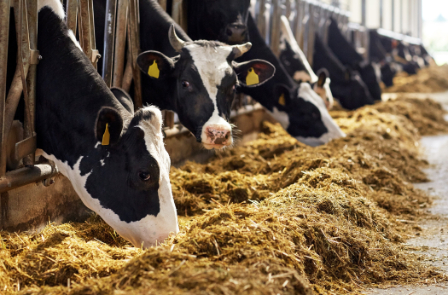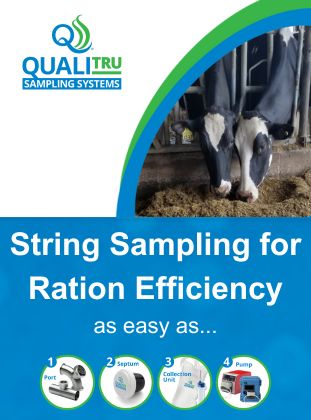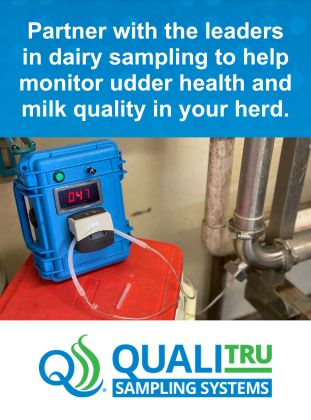Collaboration and Momentum Main Themes of Sustainable Agriculture Summit

More than 900 farmer and industry leaders gathered to discuss advancements, challenges and opprtunites for scaled action.
Article courtesy of Innovation Center for U.S. Dairy
CHARLOTTE, N.C. –Barbara O’Brien, president and CEO of Dairy Management Inc. and the Innovation Center for U.S. Dairy, said with a growing global population demanding more food, significant geo-political unrest, and unprecedented climate challenges, “we need to take a more thoughtful approach to building resilient food systems” and “agriculture must be at the forefront” during remarks at the Sustainable Agriculture Summit held Dec. 6-7 in Charlotte, N.C.
The Summit, in its ninth year, is co-hosted by the Innovation Center for U.S. Dairy, Field to Market: The Alliance for Sustainable Agriculture and six other national ag organizations to convene the collective food and agriculture value chain to learn, develop and advance a shared vision for a sustainable and resilient U.S. food system. This year’s theme was “Scaling Collective Impact: Collaborating to Accelerate Agricultural Sustainability.”
In pre-recorded keynote remarks, U.S. Secretary of Agriculture Tom Vilsack stated convenings like the Summit are critical to working toward an agricultural future that is sustainable and climate smart.
He noted the Inflation Reduction Act made nearly $20 billion available over the next five years for USDA’s Natural Resources Conservation Service to address continuous high demand for the Environmental Quality Incentive Program and the Regional Conservation Partnership Program and stressed the importance of working quickly to get this money into the hands of producers.
Featured Summit sessions and discussions included:
- the momentum that collaboration across ag sectors and their value chains can drive in order to mitigate environmental impacts;
- exploration of partnerships and opportunities to scale solutions;
- examination of the role of research and emerging technologies as a guiding force for agriculture’s sustainable future;
- the need for reporting and sourcing protocols to recognize sector/regional programs already in place;
- the importance of advancing nutrient management practices; and access to funding sources to implement solutions that further accelerate sustainable progress.
Food waste solutions were also highlighted since, in the United States, more than half of the produce is wasted, and 30 percent of total food production is lost before it reaches consumers.
Always a highlight of the Summit, producers across ag sectors shared how they approach sustainability on their farms, voicing their successes and challenges in making sustainability gains and the need to safeguard producer livelihood in the context of environmental stewardship.
Dairy farmers Andy Rodgers (Georgia), Brian Larson (Wisconsin), Greg Bethard (Kansas) and Steve Harnish (Pennsylvania) contributed perspectives on integrating sustainable practices and technologies through panel participation and breakout sessions. Rodgers said that, too often, those who advise on implementing sustainability practices and technologies don’t know enough about the unique needs of farmers’ operations to recommend solutions, and he stressed the need for that level of understanding to foster trust.
Attendees were left with these inspiring remarks by Virginia dairy farmer and National Dairy Promotion and Research Board Chair Joanna Shipp: “Sustainable agriculture isn’t a far-off goal. It’s a journey we have been on together. We’re cultivating a legacy of positive, scalable impact that will nurture future generations.”
Dairy Sustainability Alliance Fall Meeting Explores U.S. Dairy Community Efforts to Advance Shared Priorities
Dairy industry leaders explored the theme of “U.S. Dairy Sustainability in Action,” including ways individual dairy companies are demonstrating action and making impact towards shared U.S. dairy priorities during the Dairy Sustainability Alliance Fall Meeting held in Charlotte ahead of the Sustainable Agriculture Summit.
The Dairy Sustainability Alliance, formed through the checkoff-founded Innovation Center for U.S. Dairy, convenes nearly 200 companies and organizations across the dairy community and others who want to contribute to dairy’s social responsibility journey. This year’s meeting boasted record attendance, with more than 340 industry stakeholders, including approximately 30 farmers.
Themes discussed included advancing commitments and action through forums like the Dairy Sustainability Alliance; transparently communicating progress to stakeholders; sustainable food production; and investments in new research, technologies and practices on-farm and throughout the supply chain that reinforce a commitment to protecting natural resources and minimizing dairy’s environmental footprint – all while ensuring economic viability and uncovering new revenue opportunities for farmers and organizations.
The meeting’s opening panel covered insights on how farmers are currently thinking about and adapting to the effects of climate change and the complexity that goes into making practice and technology decisions on the farm. Panelists, including dairy farmer Suzanne Vold (Minnesota), emphasized that collaboration, direct conversations with the farmers, and co-investment all along the dairy value chain are required to support progress.
In another session, Brad Anderson (California Dairies, Inc.), Nicole Ayache (National Milk Producers Federation), Jackie Klippenstein (Dairy Farmers of America) and Elena Saputo (SustainCERT) discussed the importance of working collaboratively to support the modernization of GHG accounting standards to better meet the needs of agricultural sectors, including dairy.
In addition to the Fall Meeting, attendees had the opportunity to learn more about sustainable farming practices by visiting two Charlotte-area farms: White Rock Farms and Grayhouse Farms, a 2022 winner of the U.S. Dairy Sustainability Awards. The two farms showcased modern facilities and shared how conservation, cow comfort, and water and manure management practices help enhance biodiversity and recycle nutrients.
Summing up the event, O’Brien said: “The Dairy Sustainability Alliance meetings represent collaboration at its best. They are the forum for sharing best practices and learnings and for bringing together new and varied perspectives and solutions from across the value chain.”
“It’s our ability to work together against common goals combined with the diverse nature and scale of U.S. dairy – from farm to retail – that gives us a unique strength and competitive advantage in a global marketplace,” added O’Brien. “It is clear that we are leveraging our individual and collective strengths to advance action within those sustainability topics that are important to customers and consumers and to the future demand for dairy both domestically and globally.”
For information about the industry’s sustainability work and the dairy checkoff, visit www.usdairy.com.
About the Innovation Center for U.S. Dairy
The Innovation Center for U.S. Dairy® is a leadership forum that brings together the dairy community and third parties to address the changing needs and expectations of consumers and customers. Initiated in 2008 by dairy farmers through the dairy checkoff, Innovation Center leaders and members collaborate on important areas like the environment, nutrition and health, animal care, food safety, and community contributions. Through the Innovation Center, the U.S. dairy community demonstrates its commitment to continuous improvement from farm to table, striving to ensure a socially responsible and economically viable dairy community. For more information, visit www.usdairy.com/about-us/innovation-center



